
Aside from an apparent surplus of authors with the first name of Desmond here in my scrolls, what purposes does a reading of, "The Hundred Years War: The English in France 1337-1453" have to any general reader of English language, student of international relations, or global business strategist?
First, identification with the period is useful as it represented a growth in English language usage, probably unparalleled in scale aside from the last two economic global growth cycles. In addition, a reasonable standardizing effort on the part of English writers was taking place, among them Chaucer, perhaps the most notable early English poet, living in an age in which poetry was a court sponsored endeavour, as any various artists will attest, sponsorship of rich supporters guarantees food, shelter and clothing for artists of every stripe.

Much of the bounty available to any manner of snake charmers and jesters, depending on the snakes and numbers of balls in the air, the featherers of the pen, palette, or mandolin in English Courts at the time came courtesy of kingly and knightly led rape, pillage, and havoc in France. For what reason did these brutish English seek to enrich their entertainment and appreciation of culture other than a desire to match the richness of their conquests and war profits with something uniquely English?
That the wars endured for so many decades only points to the immense successes, service of greed, gains in territories, efficiency of regional taxation strategies, bounty of goods and services, and commodities available in France seemingly for the taking by English mercenaries and allies, among them a number of other currently EU member nations. Codes of chivalry appear merely as brittle as poetic verses often appear to the unappreciative. Such belief systems which may have evolved through readings and imaginings on the benefits of courtly love were merely fragile, superfulous, seemingly crusts of social protocols, similar to the common everyday pleasantries inherent in, "Have a nice day. Have a good time. How are you? Fine." Readings of such histories simply helps define ages-old inter-cultural dualities which continue to serve present day relations in Europe, in English, and in issues of global strategic actions of MNCs.
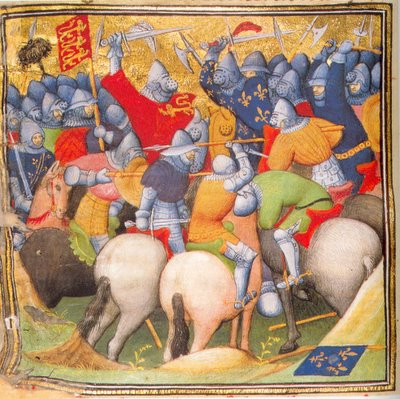
This history by Seward is not new, copyrighted 1978 and this copy dates from 1999. Which proves that the market for used books is often a good place to discover tracts which do not go out of fashion. Histories rarely do. They are useful for lots of perspectives. However best-sellers do dominate in most publishing houses, annually a short list of books often represent at least 50% of all published works. So it appears most people who really read only read what is hot at the moment. Used books represent the "lucky dip" style of learning, the adage of, "one man's trash is another man's treasure" reads true as is the higher turnover of used texts depending upon availability, price and customer interests. But seeking out of the cheaper text is like a run of shopping at Zara if one defines fashions in literature as in clothing.

Short print runs are often representative of better meeting of particular customer needs rather than general "Cabbage Patch or Garbage Pail" readers. It also implicates faster rates of purchase and sale as "one of a kind" items often disappear from the shelves precluding a second visit or slow decision-making processes. It contributes to faster, deeper reading on subjects of continued interest. In addition it can prove the largesse of major sellers, the loss of royalties gatherers, resale of books has taken on an entirely new segment of modern book reading consciousness. So the fact that the English were stealing bolts of French milled cloth and fancy furs literally off the backs of grand doyennes and French notables to frisk and frop about in the stolen folds back home, merely plants the point that the English saw the exercise of making use of the riches of others, thus second hand, as routine, exemplifies that there was little if any moral dilema in stealing from the weaker but richer French and keeping it. Idealists such as Robin Hood were notably absent from this scamming scene.
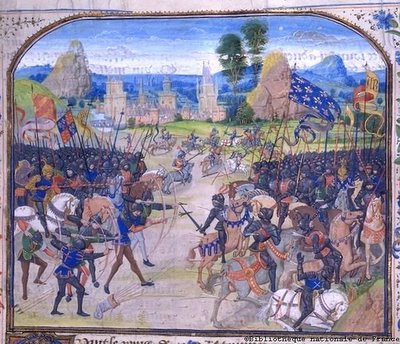
But as the introduction of this used text notes, this is a brief accounting, as brevity in reading may be favoured but not in writing about what has been read, especially among those who prefer to write for a purpose and pleasure. As early as 1337 it is granted that the beginning of the Hundred Years War was a result of Philip VI's confiscation of the English held Duchy de Guyenne from Edward III, who reciprocated with a claim on the French throne. Its end is believed to be 1453 when the English lost Bordeaux. Famous battles include Crecy, Poitiers, and Agincourt. Its most famous characters include: Edward III, the Black Prince, Henry V, John II, Charles V, Charles VII and several supporting casts of English and French stocks, including the wolves entering Paris to feed upon French corpses. Throughout the century many French could not distinguish the English from the wolves anyway. As noted, 'among those who had done best out of the war were the great landed families', and 'needy adventurers of obscure birth and no inherited property; scores of them (making) notable fortunes'.
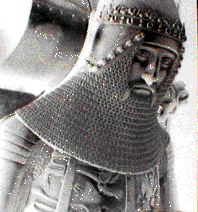
The first chapter details the parental lineages of two competitive Kings. Their lineage diverged from Philip III (1270-85). But Charles III had control over the Duchy of Aquitaine and since 1259 had maintained fragments of French coastal regions from La Rochelle to Bayonne and the Pyrenees, Saintonge and Gascony with various "bastides" or fortified towns and bastions. This area was a rich source of income as its revenues were richer and provided larger sources of taxation than those available to English Kings in England itself. Its regional capital was Bordeaux, population 30,000 and it was a major wine producing region. The English drank more wine than beer during this period than today. England was the major consumer of wine products from the region which included claret and blended varieties. In exchange, the rich, successful Gascons, who spoke a regional dialect rather than French, depended mostly upon English trade and consumed English wool, leathers, grain, resins, and salt. Even one Gascon, Guyennois Henri le Waleys was concurrent mayor of both London and Bordeaux. In Plantagenet terms, Aquitaine (Guyenne) was more important to the English than Wales or Ireland and its inhabitants were considered "English" by chroniclers such as Froissart.
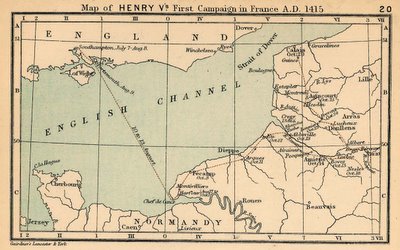
But French demands had grown along with their military and resource strengths. Seward notes a thirteenth century chronicler, Matthew Paris, as having written, 'The King of France is the King of all earthly Kings' and was more powerful than the Holy Roman Emperor, controlling the papacy from as early as 1309. Agricultural development is also noted as a factor by Seward with rich soils, as were more forests brought under production, influencing rising French birth rates, and a massive population in the 1330s estimated at 21 million whereas England stood at around four million. At that time England is likened to modern Norway by Seward, described as underpopulated, mostly forest, swamp or moorlands, with a single export product in English wool. A fairly one track economy, fairly agrarian, highly undeveloped.

London is listed at a population of 30,000 and was more difficult to rule than the French. An observation that is worthy of reference is the fact that without highly developed industries, English commoners appear to have had more autonomy, fewer resources upon which to be taxed, and shorter limits or thresholds of acceptance of taxation, if only evidenced in the results of the Peasants Revolt which took place half-way through in 1381. The English were resource starved, and the basis of successful pillage throughout history has been the generous reward of allies. In this regard, Edward III appears to have avoided conflict for as long as possible from the 1330s due to his weaknesses, and attempted several agreements and settlements from even going on the Crusades with Philip in 1332. But both Edward and Philip appeared to prize the same Gascons for the same reasons.
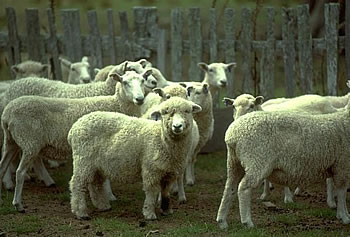
French formalisation of monarchy apparently pushed the limits of feudal systems of the time and demanded greater resources and rewards to satisfy all the landlord-ships and holdings which French Barons demanded and royal control of their loyalties demanded. English holdings in France were weak, accessible, and enticing targets for growth and conquest. Seward accounts that Edward allied with Flanders and in 1337 sent sixty knights to Hainault to begin a purchase of allies against France including individual payments made to the likes of the Duke of Brabant, in a sum of 60,000 pounds, which exceeded combined annual revenues of England and Guyenne. Due to issues of French loyalty Edward embargoed the export of wool to Flanders as protest, and he also began to heavily tax wool exports which would explain the redistribution of English tax revenues to European allies against France. His position in borrowing vast sums was highly entreprenurial and he bankrupted famous Lombardi bankers, the Bardi, the Frescobaldi,and the Peruzzi as well as various merchants in the Netherlands and England in his quest to hold Aquitaine. His efforts to mobilize a fighting force were also stymied by difficult elements of English conscription which are estimated to have included an average of 12% deemed condemned murderers although offered 'charters of pardon'. All of these challenges simply illustrated the distinctive advantages the French King Philip could muster in the areas of revenue collections based on highly evolved systems and a much larger population from which to pay his soldiers. He had such an overwhelming advantage it appears incredulous that such a series of wars could last a century.

Even from the outset, Seward easily illustrates how all of these interests eventually pushed the beginnings of the war. Philip made a declaration on 24 May, 1337 that Guyenne was forefeited by Edward as a result of '...disobedient acts...". Edward's response was a formal defiance in a letter addressed to, 'Philip of Valois who calls himself King of France'. A three year campaign by Philip resulted in the taking of the north banks of the Gironde Estuary and Blaye, implicating sea access at Bordeaux and the mouth of the Dordogne and Bourg in 1340, much of Entre-Deux-Mers and Saint Emillion were laid waste and from 1337 Edward had encircled France with allies secured through bribes and treaties including the Holy Roman Emperor Ludwig IV and Counts of the Low Countries in Burgundy and Savoy. French marauders also sacked Portsmouth in 1338 and took a number of Edward's royal cogs while raiding the coastlines between Cornwall and Kent, Dover and Folkestone, with the following occupation of Guernsey, and the firing of the Island of Wight.
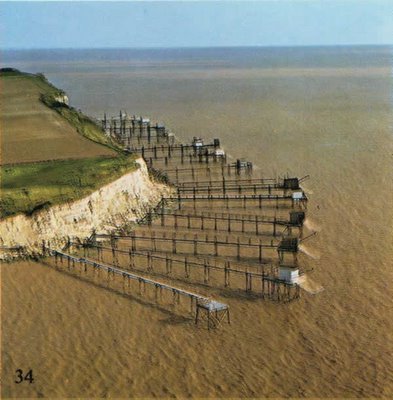
Seward relates how French dominance in the English Channel implicated English trade, and a massive fleet of two hundred ships were assembled at Sluys in Zeeland while Edward counterattacked at Boulogne. Edward needed to keep Philip from attempting a landing in England with 60,000 soldiers and began pawning the royal jewels from 1339 with an invasion and advance in France in September of that year. His desperation was revealed in small bands of English armies supplemented by German and Dutch mercenaries. The first battle with Philip's army began at Flamangerie consisting of three lines, English in front, Germans second, and Flemish Counts and Lords third. Following several antics, Philip refused to fight even though he vastly outnumbered his English opponents. These English finally retreated after a mere month traipsing and clinking about the lowlands.
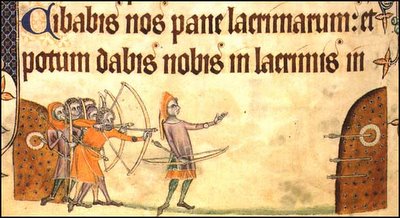
Before leaving Edward went through the pomp and circumstance of assuming the arms of France in a large ceremony in Ghent, February 6, 1340. He made vast promises to French Lords to renew their traditional rights and priviledges, appealing to their sense of profit and also to, 'revive the good laws and customs of...St Louis our ancestor'. His strategy was to localize while Philip's was to centralize power. Such machinations and further inflamatory letters to Philip provided fuel for an already roaring French furnace in terms of Aquitaine. Philip's strategy was to bait and switch, and it appears French strategy in general took up his standard over the ensuing decades. So Seward describes how Edward and his financers managed to keep up the efforts with verve and managerial skills which should be of precedence to any international business take-over interests or understanding of tribal conflicts.

No comments:
Post a Comment